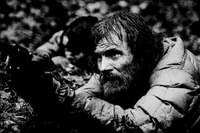The end is near as Hollywood does the apocalypse
Published: Sunday | November 15, 2009

Kodi Smit-McPhee and Viggo Mortensen star in John Hillcoat's 'The Road', based on Cormac McCarthy's Pulizter Prize winning novel. - Contributed
LOS ANGELES (AP):
It's the end of the world as we know it, and Hollywood feels fine. Global warming, wars in Iraq and Afghanistan, continuing terrorist threats and the economic meltdown have people in a gloomy, even end-of-days frame of mind. Filmmakers are tapping into worries about humanity's future with apocalyptic sagas such as 2012, The Road and The Book of Eli, along with documentaries about environmental or economic doom.
End-of-the-world stories have been a cinema subgenre since the early Cold War days with such nuclear-war movies as On the Beach, Fail-Safe and Dr Strangelove. The advent of environmentalism and overpopulation concerns resulted in another wave of films depicting bleak futures, among them Soylent Green, Silent Running and The Omega Man.
"We always need a boogeyman, we always need the end of the world," said Terry Gilliam, whose films include 1995's Twelve Monkeys, about a world where plague has wiped out most of humanity. "I think it's the problem of being in a Christian society. It's based on it. If you don't have the end of the world, you don't get heaven and eternity."
current tales
On the heels of Al Gore's global-warming alarm An Inconvenient Truth, doomsday is an especially fertile subject today, and current tales of the apocalypse take many forms:
Plagues of vampires with Ethan Hawke's upcoming Daybreakers and zombies with the horror comedy Zombieland and George Romero's Survival of the Dead.
Economic calamity with the documentary Collapse, a portrait of a pessimist convinced industrial civilisation is poised to crumble.
Environmental catastrophe with the part-fiction, part-fact The Age of Stupid, about a mid-21st century archivist looking back on our times from a world ravaged by global warming.
Devastating warfare between humans and machines with the sci-fi sequel Terminator Salvation and the animated adventure 9.
"The big difference now is it's multiple things," said John Hillcoat, director of The Road, opening November 25 and starring Viggo Mortensen in an adaptation of Cormac McCarthy's novel about a father and son trekking across a decimated America.
The Cold War "was all about Russia and America and the nuclear threat, but now it's on so many levels. The environment, there's still the nuclear threat in a way that's more viable with rogue terrorists, and there's kind of the economic thing," Hillcoat said. "Also a decade I think of the Bush administration, is enough for anyone to seriously contemplate it on a daily basis."
Denzel Washington's The Book of Eli, opening on January 15, also is a post-apocalyptic road trip across America. He plays a warrior-prophet travelling the land as keeper of knowledge that can save humanity.
The recently-released 2012 is the latest disaster story from director Roland Emmerich, this one taking the devastation even beyond what he depicted in the alien-invasion tale Independence Day or the global-warming saga The Day After Tomorrow.
nasty death
Pretty much all of us would be condemned to a nasty death in the scenario laid out in 2012 - the Earth's crust shifting and tumbling into the oceans after solar neutrinos heat up the planet's core. Yet the film-makers also see it as a fresh start of sorts, at least for a few lucky survivors.
"The disaster on our film, I see it as a backdrop of a much bigger story, which is a new beginning, not the end," said 2012 producer and composer Harald Kloser, who co-wrote the screenplay with Emmerich. "How do you handle a new beginning after a disaster of this magnitude?"
The answer is to build giant arks complete with a Noah-style menagerie of wildlife and loaded with the best of our artworks and the best - or at least, the richest - of humanity to carry on the species.
John Cusack, who leads the 2012 cast as a writer struggling to find room on the arks for his family, said another hopeful aspect the movie depicts is governments leaving behind ideology to work together on saving what they can of humanity.
petty divisions
"Cutting through all the kind of petty divisions. No more China, Russia, United States. Jew, Palestinian, Christian, Muslim," Cusack said. "It's just people."
The Road presents an unspecified disaster that has caused an entire collapse of civilisation, the landscape scorched and barren, handfuls of survivors scrabbling for food and water.
Mortensen represents the 'Everyman' best of us, a man with nothing left to hope for who nevertheless tries to instil virtue and goodness in his young son.
The film also shows the worst of humankind, packs of roving brutes resorting to savagery and cannibalism.
"Most people like to think that they're decent, but I think it's one of those situations that you really don't know until it happens," said Mortensen, who is hopeful that the nightmare vision of The Road will never come true. "I think essentially that people are good and resourceful everywhere in the world, not just in America. I tend to think it's going to be all right."
Whatever our fate, Hollywood can give audiences a taste of doomsday, then cut them loose to return to their lives.
"In disaster movies," Cusack said, "you can get that without having to pay the price of a real disaster."

















